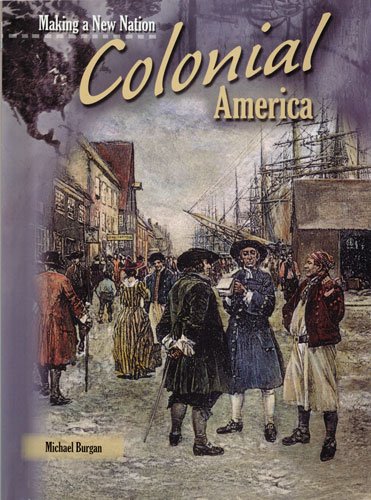-
Colonial America
Allison Lassieur
eBook (Capstone Press, Nov. 1, 2014)Europeans came to the American colonies in the 1600s and 1700s in search of a better life. They worked hard and built farms, homes, and towns. But they were still under Great Britain's rule. Many wanted to make their own laws, but that meant going to war against a rich and powerful country. Will you: Travel to Virginia as an indentured servant? Choose between careers as a sailor or a soldier in Massachusetts? Decide which side you'll take as the country marches closer to revolution? T
T
-
Work in Colonial America
Mark Thomas
Paperback (Children's Press, March 15, 2002)Learn what it is like to work in colonial times.This book introduces various jobs in Colonial America, including those performed by blacksmiths, coopers, and shoemakers. F
F
-
Colonial America Workbook
Rev. Joseph G. Cox J.C.D., Mother Marie Madeleine Amy, Robert B. Weaver
Paperback (Independently published, July 12, 2019)This workbook is the perfect accompaniment to the classic "Catholic Voyages in History" textbook, "Colonial America" for Grade 5.
-
Colonial America
Marci Appelbaum, Jeff Cantanese
Paperback (Teaching Resources, Oct. 1, 2003)Plays are the perfect way to show the story” in history. The five original plays in this collection cover key topics in colonial American history including Jamestown, the first Thanksgiving, triangular trade, the Salem witch trials, and daily life in the French, Spanish, and English colonies. Each play is paired with creative cross-curricular activities, literature and Web links, and background information. For use with Grades 4-8.
-
Colonial America
Patrice Sherman
Library Binding (Mitchell Lane Publishers, Aug. 3, 2009)If you grew up in colonial America, making your bed would mean more than just tucking in the sheets and pulling up the spread. You d have to gather hay to stuff a straw-tick mattress and pluck a goose for a cozy down quilt. Colonial kids whittled pegs, spun thread, churned butter, and even cooked up their own soap in big iron kettles. Between chores, they learned the alphabet from hornbooks they wore around their necks. Yet no matter how hard they worked, they still had time for a game of blindman s bluff or king of the hill. How did they do all this? Maybe they took a tip from the mysterious Poor Richard, who said, Have you something to do tomorrow? Do it today. Meet Hopewell of Bayberry Cove and many other children of the American colonies. (And find out who Poor Richard really was!) T
T
-
Colonial America
D. Thorp
Hardcover (Grolier Academic Reference, Feb. 16, 1998)Book by
-
Colonial America
Deirdre Clancy Steer, Amela Baksic
Hardcover (Chelsea House Publications, May 1, 2009)In this work, readers will learn how men and women dressed, from the earliest settlers to those who fought in the Revolutionary War, from the rich landowners to the poorest servants.
-
Colonial America
Bonnie L. Lukes
Library Binding (Lucent Books, Jan. 1, 2000)Discusses settlement in colonial America and life in the thirteen colonies
-
Colonial America
Peggy Saari, Julie Carnagie
Hardcover (U-X-L, Oct. 27, 1999)This reference will help users understand the people of Colonial America with 60 full-length biographical sketches of both well-known figures and lesser-known figures. Many of the entries contain short biographies of people who are in some way connected with the main biographee. Also included are sidebars of related information; a Further Research section; a Words to Know| section; a cumulative subject index; and approximately 120 photographs.|PIM|31-MAY-18|01 Z+
Z+
-
Work in Colonial America
Mark Thomas
Library Binding (Childrens Pr, March 15, 2002)A simple introduction to various jobs in Colonial America, including those performed by blacksmiths, coopers, and shoemakers. K
K
-
Colonial America
Michael Burgan
Library Binding (Heinemann, Aug. 16, 2006)Why did the European nations set up colonies? What was daily life like for the colonists? How did colonists and Native Americans help each other? North America was a rich land, full of natural resources. European nations raced to set up colonies in order to make use of these resources. The continent's reputation as a land of opportunity attracted thousands of settlers, but life for these colonists was hard and sometimes dangerous. W
W
-
Colonial America
Richard Steins
Library Binding (Heinemann/Raintree, Jan. 1, 2000)Describes the daily life and important events in the American colonies during the time of British rule. W
W